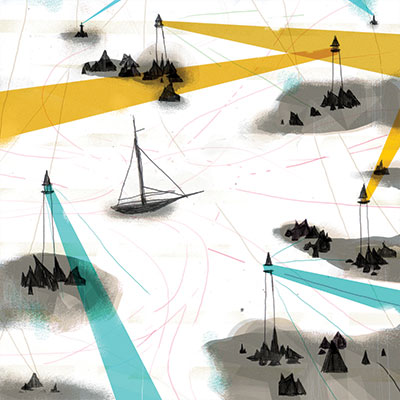I spent my freshman year trying out everything Brown had to offer—at least as much as I could fit into two semesters. I took classes in nine different departments that year, added five more as a sophomore, another two as a junior, and one more senior year. Impossibly, I liked almost everything.
As an incoming freshman, I asked an older friend for course recommendations. He told me to take BI45: Animal Behavior, Ecological and Evolutionary Determinants. After getting the prerequisite under my belt, I took the class sophomore year. Then I became a biology concentrator. With one class, I’d set up my future. Or so I thought.
 Spring semester junior year I enrolled in a tropical biology program, exploring Costa Rica’s rainforests, dry forests, cloud forests, oak forests, and ocean. Each day I donned snake boots, packed my Rite in the Rain notebook and a couple of liters of water, and headed into the jungle.
Spring semester junior year I enrolled in a tropical biology program, exploring Costa Rica’s rainforests, dry forests, cloud forests, oak forests, and ocean. Each day I donned snake boots, packed my Rite in the Rain notebook and a couple of liters of water, and headed into the jungle.
It was an awakening. None of the myriad scientific papers I’d read prepared me for the patience and diligence that go into scientific research. None had prepared me for the acute attention to minutiae that keeps science accurate, and scientific integrity intact. Or for the tedium.
My first independent research project involved a bit of animal cruelty. To test the aggressiveness of a particular species of ant, my partner and I planned to pin live grasshoppers to trees, which the ants vigorously defend, and measure the magnitude of the ants’ response. Alas, our sadistic experiment was foiled: we couldn’t collect enough grasshoppers. So we tried beetles. I think they knew they were targeted for sacrifice, because the horde that had swarmed for weeks disappeared when we needed them.
We salvaged the experiment, but the process was frustrating. After just five days of data collection, I’d had enough. This realization scared me. I’d gone into the program hoping to discover my passion, but I came out wanting to stay as far away from a research career as possible.
I was stuck. How could I be a biology concentrator who doesn’t want to do research or go to med school? I began to consider other options.
I spent the summer before senior year taking organic chemistry so I could graduate on time. As I memorized functional groups (ketones, alkyls, esters, alcohols), I accepted the idea that finding out you don’t like something can be invaluable. The next step was to sift through loads of interests to find the standout(s). I enjoyed feminist philosophy (PL18) and twentieth-century dance (TA128) and Italian (IT10-20) and neuroscience (BN1). I liked learning about Frank Lloyd Wright’s architectural revolution (HA85) and top-down and bottom-up controlled trophic systems (BI42).
But what is my passion? Is my education too well rounded?
I don’t think so. In biology, we talk about the advantages of being a specialist rather than a generalist. In some situations, specialists out-compete generalists. Yet there is always the possibility that the specialist will disappear. The common thread through all the courses I took is the curiosity they inspire. I loved learning, and that’s the best thing I could have hoped to get out of my education.
I’m hoping that my academic attention deficit disorder will work to my advantage. Brown’s open curriculum forced me to be self-motivated and independent, with a strong desire to navigate my educational path and, now, my career path. Fortunately, I found a job that combines several of my interests and will allow me to grow intellectually and professionally. Maybe it will even be my passion. I’ll write back in ten years with an update.
Vaughn Edelson is working for Genetic Alliance, an advocacy group in Washington, D.C.




